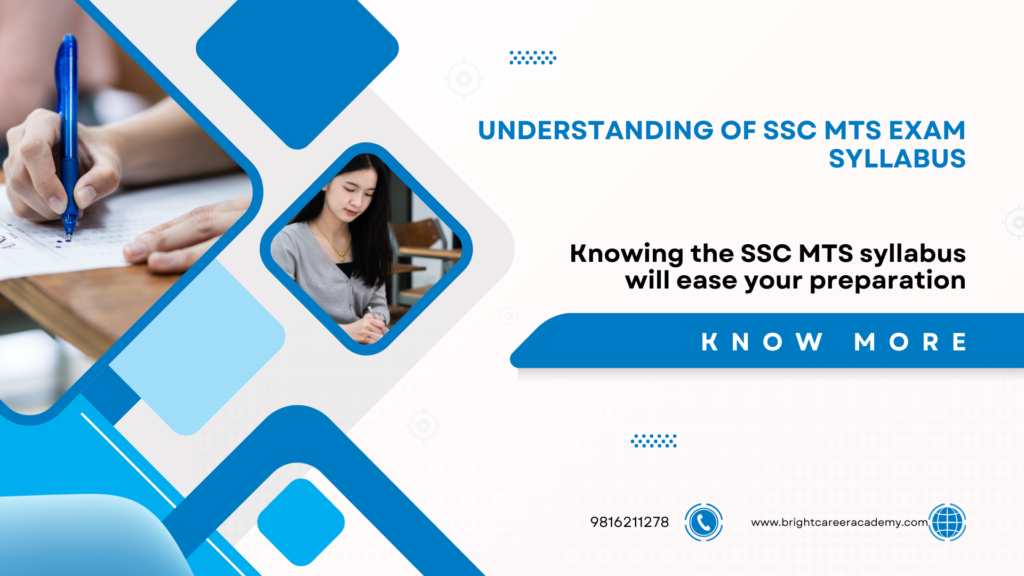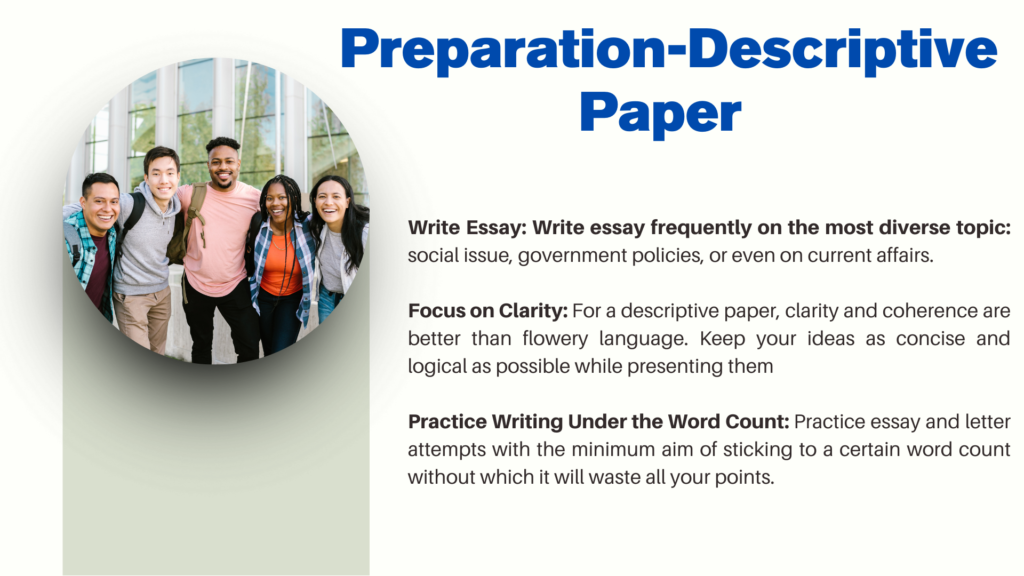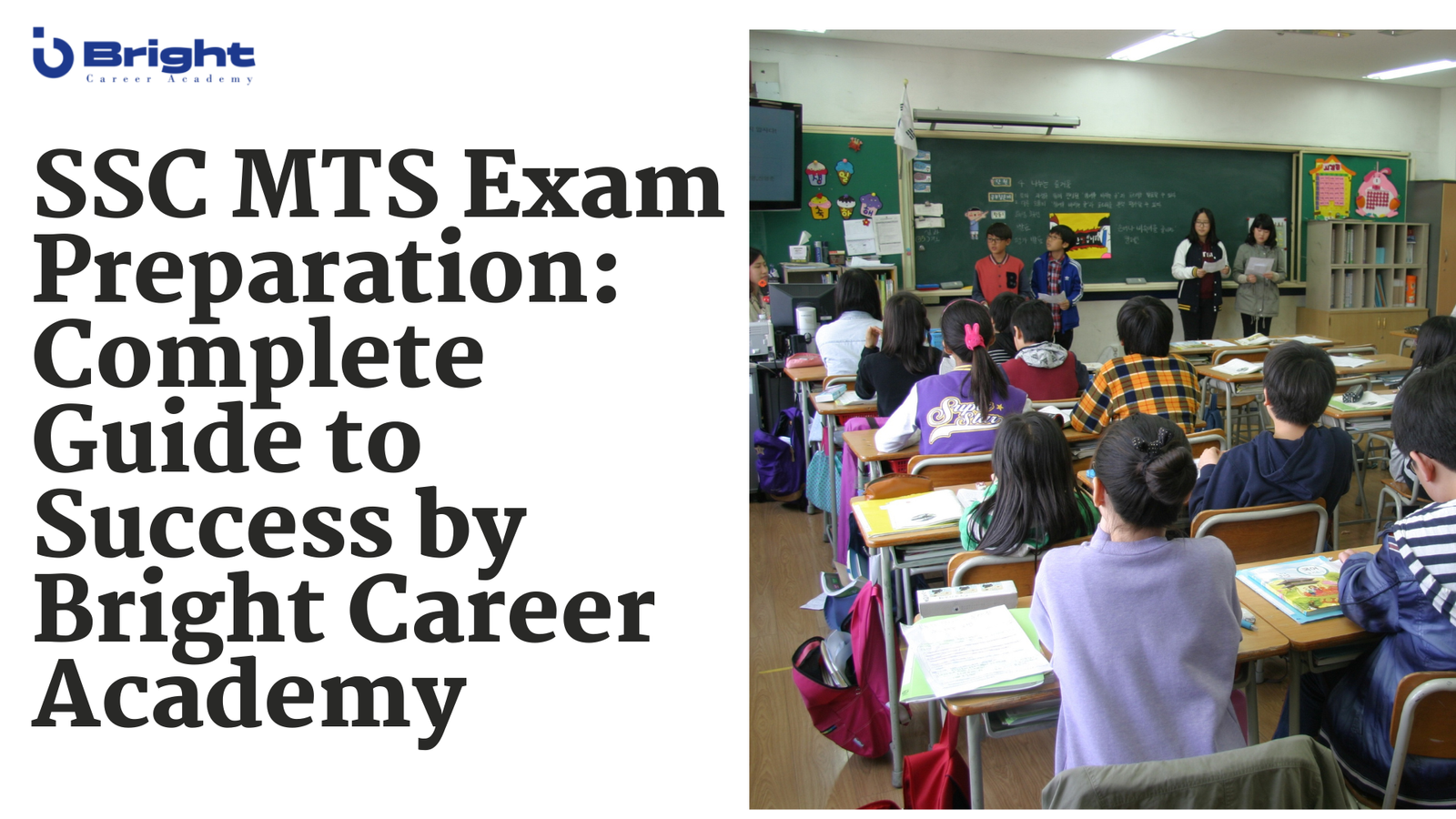
SSC MTS stands for Staff Selection Commission Multi Tasking. It is one of the most popular exams for those students who want to get a job in the Indian government. This is a passage to various non-technical jobs in the different departments and ministries of the government, like peons, daftaris, chowkidars, etc. SSC MTS exam is one of the best opportunities that opens up a government job scope for 10th pass aspirants. When thousands of aspirants fight for just a few vacant positions, strategy in preparation becomes really crucial.
This is Bright Career Academy, Shimla‘s best coaching center, totally understanding the challenge that clearing SSC MTS examination poses. So, here we would guide you step by step about how to prepare for the SSC MTS exam through some invaluable tips, strategies, and study resources that will make you crack this exam without any hassle.
Overview of SSC MTS Exam
Before we proceed with the preparation tips, it is very important to know the structure and pattern of SSC MTS. Knowing the pattern of the exam will help you to tailor your study approach and prepare accordingly.
1. SSC MTS Exam Pattern:

The SSC MTS examination consists of two stages:
Tier 1 (Paper 1): It is an objective-type computer-based test consisting of 4 sections:
General Intelligence and Reasoning (25 questions, 25 marks)
Numerical Aptitude (25 questions, 25 marks)
General English (25 questions, 25 marks)
General Awareness (25 questions, 25 marks)
Tier 2 (Paper 2): A descriptive paper to assess your writing skills through an essay or letter writing. It is of 50 marks.
Skill Test (for selected posts only): In a few posts, typing or computer test would be conducted.
This stage is an eliminator stage, and only candidates who pass Tier 1 will be advanced to Tier 2 and, for some posts, the Skill Test.
2. Planning of a structured study plan
A proper study plan is the need to crack the SSC MTS exam. Without an appropriate roadmap, one will soon get lost, not staying focused and saving his time. Structuring study planning will guide you throughout the syllabus and ensure regular progress.
How to Make Your Study Plan
Specific Set Goals: Make short-term goals besides long-term goals. Divide the syllabus into pieces and dedicate certain days to certain topics. Ensure your set goals are achievable within the given time.
Daily and Weekly Targets: Targets of study per day on one subject and evaluate the extent of progress towards the end of the week and alter your study plan if required.
Provide some gap periods for recreation purposes to prevent burning out. Fresh mind makes an efficient worker
Example 3 Month Study Schedule:
1st week- 4th week General Intelligence and Reasoning & Numerical Aptitude
5th week-8th week General English & General Awareness
9th week-12th week Mock test, Weak subject revision & Tier 1 Practice paper.
3. Understanding of SSC MTS exam Syllabus

Knowing the SSC MTS syllabus will ease your preparation. So, let’s break down the syllabus for Tier 1 so that you cover all important topics.
Tier 1 – General Intelligence and Reasoning
This part tests your logical reasoning and mental ability. The areas covered are:
Verbal Reasoning: Analogies, Classification, Series, Coding-Decoding, Blood Relations, Direction Sense, and Ranking.
Non-Verbal Reasoning: Questions involving a toy figurine in the form of mirror images, paper folding, and pattern completion.
Logical Reasoning: Venn Diagrams, Syllogisms, Seating Arrangements, and Puzzles.
Tier 1 – Numerical Aptitude
This section will test your mathematical and numerical aptitude. The concentration area for this section should be:
Arithmetic: Percentage, Profit and Loss, Simple and Compound Interest, Time and Work, Speed and Distance, and Time and Distance.
Algebra: Basic equations, Ratio and Proportion.
Geometry: Angles, Areas, and Volumes
Trigonometry: Basic Trigonometric Ratios
Data Interpretation: Bar graphs, Pie charts, and Tables
Tier 1 – General English
This tier focuses on testing the general English. The particular topics in this category include:
Grammar: Tenses, Subject Verb Agreement, Active/Passive Voice, Direct/Indirect Speech
Vocabulary: Synonyms, Antonyms, Idioms, Phrases
Reading Comprehension: Read and comprehend a passage.
Sentence Formation: Constructing a correct sentence from various options. Reforming the sequence of the same sentence
This is the General Awareness section that tests your knowledge of current affairs, history, geography, polity, and other similar subjects. So, listen up to the following:
Current Affairs: National and International news, Sports, Awards.
History: Indian History (Ancient, Medieval, and Modern).
Geography: Physical, Political, and Economic Geography.
Polity: Indian Constitution, Governance, and Political System.
Science: General Science (Physics, Chemistry, Biology).
4. Tips for Each Section
Now, here are some of the most important tips regarding each section:
General Intelligence and Reasoning:
Practice various reasoning problems for cracking the problems faster.
Stress on non-verbal reasoning as most of the questions are based on it.
Clear thinking through solving puzzle and seating arrangement problems
Numerical Aptitude:
Practice from simple arithmetical concepts to advance concepts
Short cuts to solve tougher sums
Question papers of previous years are a must for getting an idea about the toughness of the exam and types of questions asked.
General English:
Practice your vocabulary from newspapers. Take down new words.
Practice grammar exercises regularly. Concentrate on most common mistakes in exams.
Do reading comprehension exercises and improve your reading speed.
General Awareness:
Read newspapers daily to update your knowledge about current events and issues.
Important dates, events, and government schemes: Note down to be referred easily
Use current affairs apps and websites to keep up with what is important.
5. Mock Tests on Regular Basis
Mock tests are the best ways to judge how well you are prepared for an exam. In fact, mock tests provide a real feel of the exam and let you know where you need improvement.
Advantages of Mock Tests
Manage your time well in the exam.
Analyze your strength and weakness.
Get an idea of pattern and difficulty level of the actual exam.
We at Bright Career Academy simulate the SSC MTS exam during our mock tests, so that you can give yourself as many opportunities as you want to take practice and make improvements on those mistakes.
6. Time Management and Speed
The SSC MTS is time-bound. Proper time management is required so that you are able to complete the paper with good marks. Time management tips:
Time-bound practice tests: Whenever you are practicing any test, try to use a timer for time-bound practice.
Do not get stuck to difficult questions: If you are finding a question difficult, just move on and come back to it later if time allows.
Time for each section: Allocate time to every section during the exam. For example, use not more than 20-25 minutes on the General Awareness section.
7. Tier 2 Preparation-Descriptive Paper

SSC MTS exam Tier 2 is the descriptive paper which checks your writing skill. In this paper, you need to write an essay or a letter, or an application in English or Hindi.
Write Essay: Write essay frequently on the most diverse topic: social issue, government policies, or even on current affairs.
Focus on Clarity: For a descriptive paper, clarity and coherence are better than flowery language. Keep your ideas as concise and logical as possible while presenting them
Practice Writing Under the Word Count: Practice essay and letter attempts with the minimum aim of sticking to a certain word count without which it will waste all your points.
8. Healthy Motivation

The stress of preparing for SSC MTS might overwhelm you, but you will find yourself fresh and focused on the things with a properly balanced lifestyle. Follow these habits that keep on helping you not to give up:
Take breaks: Study by intervals and breaks to refresh the mind.
Do exercise: Good physical activity provides focus and prevents stress.
Eating healthy: Keep maintaining a healthy diet to energize your body and mind.
Stay Positive: Maintain your energy levels by recording your progress and winning small victories.
Conclusion
The SSC MTS exam is so competitive that it can, in fact, be cracked if you have the right strategy on your part coupled with constant efforts. If you focus well on your syllabus, get yourself used to regular mock tests, and stay disciplined, of course, you will crack it. Bright Career Academy is providing personalized guide, study materials, and mock tests in return to which you get the competitive edge to crack SSC MTS and pass the examination.
1. What is the SSC MTS Exam?
SSC MTS stands for Staff Selection Commission Multi Tasking. It is one of the most popular exams for those students who want to get a job in the Indian government. This is a passage to various non-technical jobs in the different departments and ministries of the government, like peons, daftaris, chowkidars, etc. SSC MTS exam is one of the best opportunities that opens up a government job scope for 10th pass aspirants.
2. What are the eligibility criteria for the SSC MTS exam?
The eligibility criteria for the SSC MTS exam is he or she should be 10th pass and the age limit is 18 to 25.
3. What is the age limit for the SSC MTS exam?
The age limit for the SSC MTS exam is 18 to 25.
4. How many times can I appear for the SSC MTS exam?
There is no limit you can apply as many times you want.
5. Is there negative marking in SSC MTS?
Yes There is negative marking in SSC MTS exam.



